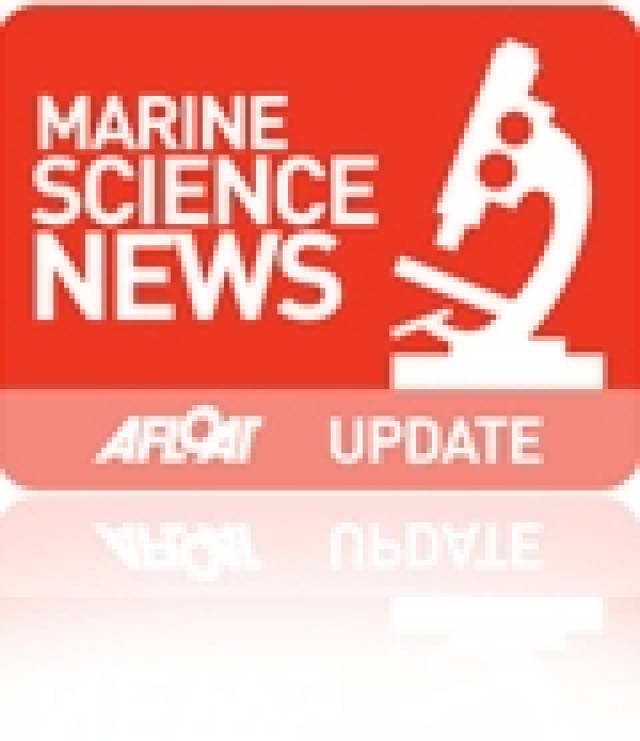#marine science – Irish and Canadian scientists join forces on a transatlantic survey onboard the Irish National Research Vessel, RV Celtic Explorer which sets sail today for the Labrador and Newfoundland Seas to carry out fisheries research.
Canadian Ambassador to Ireland, his Excellency, Loyola Hearn, boarded the RV Celtic Explorer at Galway Docks today to meet the Irish and Canadian collaborators in this transatlantic expedition from Galway to St. Johns, Newfoundland.
The survey led by Dr George Rose, Director of the Centre for Fisheries Ecosystems Research at the Fisheries and Marine Institute of Memorial University of Newfoundland (MUN), is multidisciplinary and will gather oceanographic data as well as acoustic recordings across the entire North Atlantic, building on work done on the two previous transatlantic surveys in 2011 and 2012. Canadian scientists will be joined onboard by Irish researchers from National University of Ireland, Galway (NUI Galway) and Mayo Institute of Technology (GMIT). Sheena Fennell, NUI Galway will carry out oceanographic monitoring throughout the journey to St. John's and will collaborate with Dr Rose on the acoustic data collected during the transatlantic trip. The aim is to search for 'hot spots' of smaller mid-water fish, such as lanternfish and begin to understand their distribution.
The vessel will research the cod stocks on the Flemish Cap en route to Newfoundland and Labrador before completing a large scale survey for cod and capelin in Newfoundland and Labrador waters. As a former Minister of Fisheries and Oceans, Loyola Hearn was particularly interested to board the RV Celtic Explorer ahead of it transatlantic passage to Newfoundland and Labrador. Mr. Hearn said, "We are now seeing growth in the fish stocks off Newfoundland and Labrador, and surveys like this provide essential information on the sustainability of fish stocks. The potential for increased involvement both in ocean research and the fishing industry between Ireland and Canada is now being realised. The Celtic Explorer is an ideal ship to carry out this research which will be of such great benefit to both countries."
Dr. Peter Heffernan, Chief Executive, Marine Institute said, "This transatlantic collaboration is hugely important for Ireland and builds on the strong relationship between Ireland and Newfoundland and Labrador established since the first Newfoundland survey on the Celtic Explorer in 2011. It will allow Irish researchers to forge strong links with their Canadian counterparts as part of a wider international ocean observatory initiative. This is particularly relevant in the context of the European Union's Atlantic Strategy and the emerging Action Plan, which is on course to be completed during the Irish Presidency of the EU.
"This type of multidisciplinary research and international cooperation is essential to achieving healthy marine ecosystems – which is a key goal of the Government's Integrated Marine Plan for Ireland - Harnessing Our Ocean Wealth, published in 2012. We are delighted with this collaboration with our Canadian partners".
Dr. George Rose reiterated those sentiments, saying "This voyage continues to have tremendous value to both Irish and Canadian researchers, and contributes significantly to the knowledge base and prosperity of the Newfoundland and Labrador fisheries. I look forward to the continuance of this collaboration".
During the passage, an observational platform that sits on the seabed called a benthic lander system, will be deployed at a depth of 800-900m in a canyon on the continental shelf off the Irish Coast to measure turbidity, flouresence, temperature, salinity, water column and near seabed currents. The lander will remain in the canyon until June when it will be recovered during an NUI Galway led biodiscovery survey onboard the Celtic Explorer.
A Galway and Mayo Institute of Technology researcher will monitor cetacean activity during the passage across the Atlantic to Newfoundland and Labrador.
University College Cork graduate, Rachel Morgan will join the survey through the Training Through Research Surveys Scheme, run by the Strategic Marine Alliance for Research and Training (SMART). The programme gives young Irish researchers an opportunity to gain an invaluable experience on multidisciplinary surveys.
The survey is primarily funded through charter of the national research vessel by the Fisheries and Marine Institute of Memorial University. It builds on a strong collaborative relationship between the Irish Marine Institute and the Marine Institute of MUN and facilitates a transatlantic multidisciplinary survey which brings together experienced Irish and Canadian oceanographers, marine biologists, benthic ecologists, as well as young researchers who will gain invaluable experience onboard this survey.
Participation of third level students is funded though the Strategic Marine Alliance for Research and Training (SMART) programme.

































































